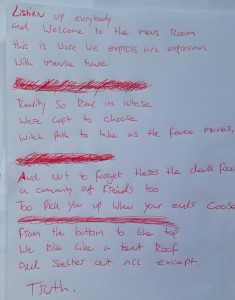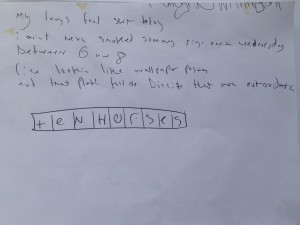Audible and voluble expressions – part 1 (2014)
Post by Jenny Hughes
It’s been a pleasure to be part of the latest art project at the Men’s Room Manchester, which celebrated its outcome a week or so ago. The project focused on musical performance, making use of rap, hip hop as well as spoken word poetry. The young men attending the Men’s Room have been working in weekly creative workshops since March of this year to write, perform, and record tracks, led by music artists Persia and JSD (Virus Syndicate) to set the themes, create lyrics and learn how to produce tracks using music editing software.
One of the most pleasurable things about this work for me has been reading and listening to the men’s words, scribbled on scraps of paper, poured over with concentration and performed to each other in conditions of rapt attention. The studious atmosphere in many workshops was brilliant and, fair to say, pretty rare in my experience of the Men’s Room (I’ve been involved with the project for a few years now). The emotional quality of many of the lyrics was surprising and powerful, and there were creative uses of the twists and turns of language, rhythm, flow, beat and gesture to express what the group called ‘real’ feelings and experiences. The evident affinity amongst some of the young men for expression in these forms – connecting to ‘underground’ musical cultures – was a facilitating factor. I enjoyed feeling off-balance in the face of my utter ignorance when witnessing the artists and young men talk passionately about events, tracks, musicians that I had never heard of.
The young men who were good at expressing themselves in these forms demonstrated a brilliant inventiveness with the language that has nothing to do with education in a formal sense but everything to do with a feeling for words, and they way they can be combined to create beat, rhythm, flow. The ‘audible and voluble presence’ of the young men achieved through these forms of performance are akin to, in the words of JSD, ‘modern day Shakespeare’. I saw a bit of this in the project, and JSD talked about the revival of the battle form that is rejuvenating hip hop culture at present as also demonstrating this (for an example, look up ‘Shotty Horroh versus Arsonal’ on You Tube – incredible lyricism and theatricality). Interestingly, many of the young men could remember masses of their own and others’ lyrics without recourse to anything written down, reciting lengthy excerpts from tracks and improvising them anew seemingly at will. A favourite moment – I asked ‘D’ to rap about our dinner (each creative session ended with a hot meal) and without pausing for breath he treated me and others sitting nearby to a rap that compared the crappiness of the meal on offer to memories of his nan’s Sunday roasts as a child. I asked him if he ever wrote anything down and he said ‘I prefer to see what comes’. There is an apparent lack of order, perhaps, in this approach – but I think this is a misperception – D’s lyrics have a distinctive flow and personal signature, providing a structure that facilitates his self expression.
The outcome of the project was a CD with 8 tracks, telling a day in the life of ‘Mike’ – a young man who gets thrown out of home and gets into all kinds of trouble. Here’s a taster from 3 of the tracks – the opening of ‘Boxed Mind’, the first track in the CD, which introduces Mike; ‘Jack Move’ – the story of his involvement in a robbery; and ‘Still Changing’, the penultimate track that describes Mike’s efforts to sort himself out. Listen carefully – the lyrics in places are amazing –
Boxed Mind:
Jack Move:
Still Changing:
(all tracks copyrighted to the Men’s Room and available here with permission of the Men’s Room and the artists)
In some tracks, the words come at the listener thick and fast, and so listening demands an extraordinarily present kind of attentiveness, and it was spine-tingling to be part of a live performance of these tracks, even when the audience was just a small group of young men gathered in the workshop space. A tangible sense of support and comradeship was an evident part of these performances, with audible responses and visible gestures of approval for particular turns of phrase. Often, this happened when catching phrases that were particularly inventive, or funny, but it also happened when the performer was communicating something particularly ‘real’ or ‘truthful’, often difficult and painful experiences.
I’ve collected the scraps of paper and I like the juxtaposition of their messiness, the scribbles and doodles, spelling mistakes, with the power that they accrue in performance. Here are two contrasting lyrics written in response to an invitation to write a lyric to reflect on the project, and the Men’s Room, at the end of the project:
And the words are below (notice the imagery – the intensity of reality, uncertainty, sense of ever-shifting signposts, shelter – in the first – and the mickey-making of the exercise in the second – two responses that pretty effectively sum up the Men’s Room) –
Listen up everybody
And welcome to the Men’s Room
This is where we express our express
With immense tune
Reality so real it’s intense
We’re left to choose
Which path to take as the fence moves
And not to forget, there’s the denk food
And a community of friends too
To pick you up when your end’s loose
From the bottom to the top
They rise like a tent roof
And shelter out all except truth
My lungs feel shitty today
I ain’t never smoked so many cigs on a Wednesday
Between 6 and 8
Rice looking like wallpaper paste
And that plate full of biscuits that’s out of date
Here’s the lyrical reflections of artists – JSD and Persia – on the project:
JSD lyrical reflection:
Persia lyrical reflection:
And here’s the written versions of both of these – JSD and Persia
When working with the young men to record their tracks, the artists encouraged them to be cheeky and cocky in their delivery, and then showed on the editing software the difference in the density of the sound waves between a tentative and confident delivery. The sound wave winking back from the screen gave the men’s communicative power a tangible visual form. The artists’ fierce, relentless, unconditional and passionate encouragement to the men to achieve this strong quality of presence in space and time was, for me, one of the most important factors supporting the success of this project. Often disparaged, dismissed, stereotyped – young men from pressurised backgrounds in Manchester struggle to find a way to populate public space so that their energy, strengths, intelligence and creativity are appreciated. This connects to a theme from the broader research into performance and poverty presented via this blog and website – the transactions between the persona of someone marked poor, marginalised, at risk, disadvantaged (all problematic terms) and broader audiences and publics. The ways the ‘marginalised’ are perceived are often damaging for the one marked out. Putting lyrical performance into the mix here, and celebrating the audible and voluble presence of people, opens up reception and perception to fragility in the most beautiful way – here, arguably, the energy released unsettles misperceptions and reveals their constructed-ness, and this energy and its effects – rather than the security of fixed identification – is what shouts loudest at the end of the day.
‘Audible and voluble expressions – part 2 (1887)’ – following soon …
Interviews with the young men, JSD and Persia, the ‘A day in the life …’ CD, as well as a series of interviews with Men’s Room staff, will be uploaded to the Poor Theatres database soon …



Comments are closed
Sorry, but you cannot leave a comment for this post.